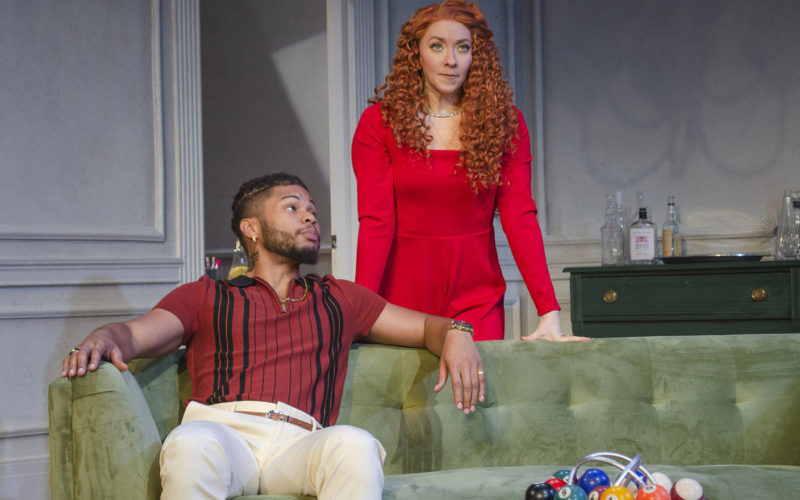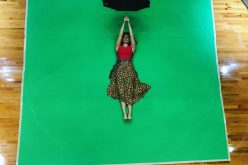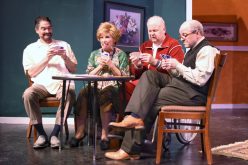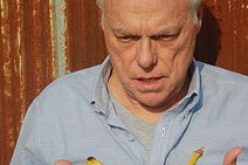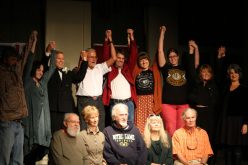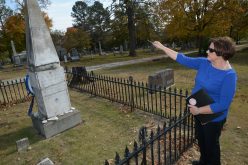BECCA MARTIN-BROWN
bmartin@nwaonline.com
“You find it so hard to accept that a young girl might … want – just a little peek in at a world which – which she is not permitted to know anything about at all. Nothing!” — Hedda Gabler
_
“I chose Hedda Gabler for my thesis show because I re-read it in 2020 and couldn’t believe that the play is over a hundred years old and yet still felt so relevant,” says Lacy Post, a graduate student in directing in the University of Arkansas Department of Theatre. “The story is both past and present because the themes of gender inequality and mental health struggles remain today.”
Written by Norwegian playwright Henrik Ibsen and premiered in 1891 in Munich, “Hedda Gabler” is the story of a young woman “confined in a meaningless marriage,” as critic Michael Billington put it in The Guardian in 2016. Billington describes Hedda’s “blank-eyed resignation [as she] recalls the process that led inexorably to her marriage” but also comments on her “demonic side” —“a mad spirit lurking inside the body of a social conservative.”
Sometimes compared to Hamlet, Hedda Gabler is considered by many to be one of the greatest roles in modern drama. As Concord Theatricals puts it, “she plays her husband for a fool, and she systematically destroys first the manuscript and then the life of the male friend who idolizes her, before she exercises her own right to coup de grace,” ending the tale with her death.
Setting her production in current-day Copenhagen, “with nods to 1890 when it was written, both in costume and set design,” Post says she sees Hedda as “a product of her society, and my goal is to present her as a tragic figure, more victim than villain. I choose to see Hedda not as self-centered, but someone who is suffering. She endures disappointment after disappointment, and she lacks control over her circumstances, which drives her to do ugly things to other people and ultimately to herself.”
Leah Smith, an MFA student in acting, says Hedda is the hardest role she’s ever played.
“She’s like a jaguar trapped in a cage, unable to get out, and in order to take control of her life, she lashes out in seemingly unreasonable ways,” says Smith. “Ways that are hard for standard people to justify. To approach this role and to humanize somebody who on a surface level can seem quite villainous is so exciting! You have to find where their heart is and why they do the things they do.”
“I think Ibsen intended for this play to ask its audience to reflect on their society, and our production aims to do the same,” Post continues. “Every person in this play, including Hedda herself, is partially to blame for what happens to her. So I think the questions we’re left with are: How can we be so brutal to one another? What are the consequences of selfishness? What part did, or do, I play in another’s complete demise?”
“This show is a classic for a reason,” says Smith. “It’s still done today because it’s so complicated and enigmatic and timeless in a way that even though it’s a period piece, it still has themes that are about human nature, specifically about the roles of women in society, that I think are so needed to be heard at any given time but especially now.
“Ibsen wrote deep three-dimensional characters far beyond their time period but products of their time period,” she adds.
Smith grew up on stage as a kid in Cleveland, Ohio, as did Post in Claremore and Tulsa, Okla. But while Post studied theater in college in New York, Smith chose the “practical” career path she was encouraged to take, getting a bachelor of arts in communications from St. Louis University. Post worked “as an actor, director, stage manager, producer — anything theater related, really” before deciding to pursue her MFA at the university. Smith spent about five years working in communications in the nonprofit sector in Cleveland before auditioning for a musical and finding her way into professional theater for another five years. UA professor Amy Herzberg recruited her for the MFA program in acting.
“My passion for directing comes from my love of working with people, storytelling, and problem-solving, or ‘putting it all together,’” says Post. “The reward is getting to work with designers and playwrights and actors with all of their different brains, which is never boring.
“Hopefully our cast and crew learn how an old play can feel just as fresh as a new play with the right focus and intent, how much fun it can be to recontextualize a classic, and that, as with anything, the worth is the work put into it.”
Smith says there’s also a personal dimension involved in playing Hedda — not letting the lonely and bitter character follow her home.
“I’ve struggled with mental health issues for a large portion of my adult life, so this has been challenging but also cathartic in that I am able to see and understand where somebody like this is coming from,” she says. “And it helps to come home and recognize that I have a lot more autonomy that Hedda did or that a lot of people do when they’re stuck in a marriage or situation they can’t get out of.”
Post leaves playgoers with both a warning and a promise.
“Audiences should come in knowing it’s a tragedy, so unfortunately there is no happy ending to this story,” she says. “It is not a show to bring the kids to. But knowing that, you can be prepared to look for the reasons to appreciate it and recognize it for the cautionary tale that it was over 130 years ago and still is today.”
FAQ
‘Hedda Gabler’
WHEN — 7:30 p.m. Feb. 23-25; 2 p.m. Feb. 26
WHERE — University Theatre on the University of Arkansas campus in Fayetteville
COST — $5-$20
INFO — uark.universitytickets.com

